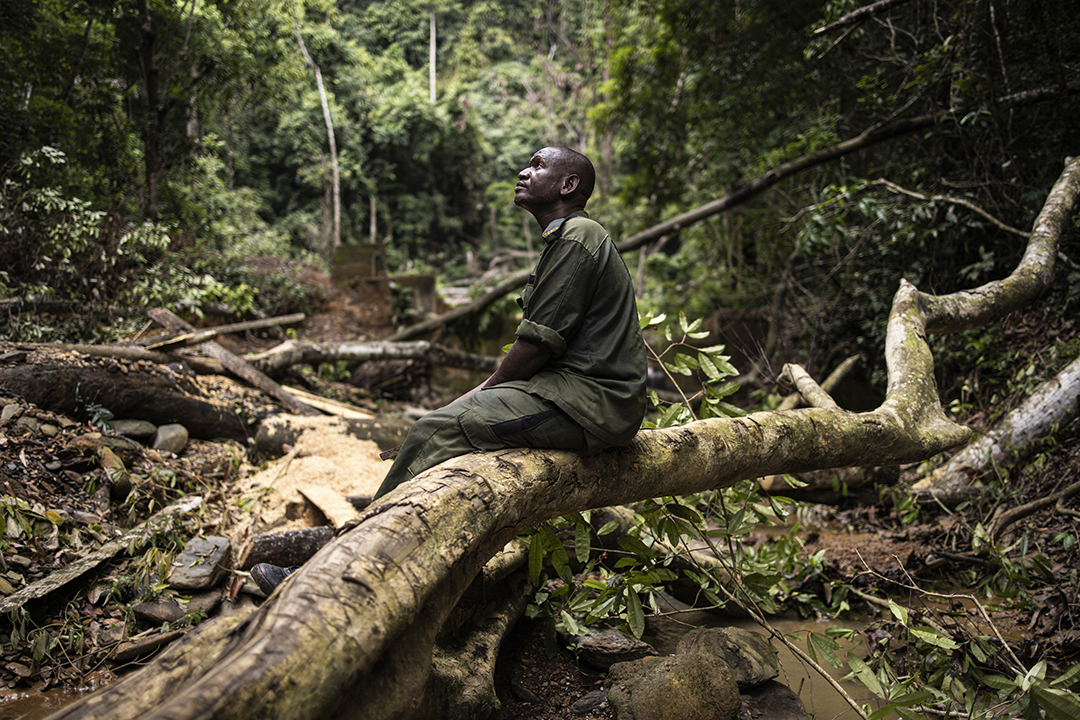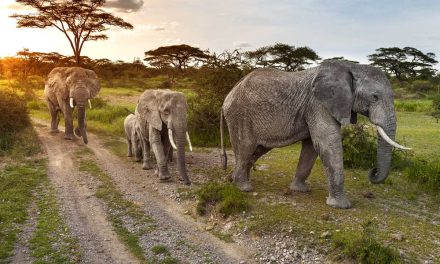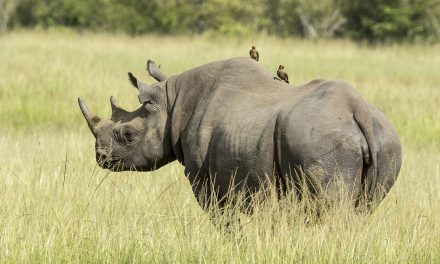Illegal forestry in Africa thrives where there is conflict and where law enforcement is weak. About 30% of Africa’s forests are fast disappearing because of illegal logging and timber trade, according to the African Union.
The unseen effects may be far more devastating in the long term than in the immediate aftermath of the denuded wastelands.
Africa’s tropical forests, where illegal logging is most prevalent, are the most carbon-rich ecosystems, storing 150 to 300 tonnes of carbon per hectare (above ground). Mature forests, particularly old-growth ones, have had decades or centuries to accumulate carbon in their biomass and soils. It can take as long for new forests to sequester as much carbon as a mature forest holds.

A National Protected Area Authority (NPAA) forest ranger sits on a log at an illegal logging site in the Kambui forest reserve outside Kenema, Sierra Leone, on June 14, 2024. Forest rangers are entrusted with guarding the pristine Kambui forest from illegal miners and loggers, but with just 62 rangers and around 14,000 hectares to cover, it is a losing battle. Photo: JOHN WESSELS /AFP
Established forests also contain diverse species that contribute to overall forest health and resilience. A new forest also lacks the biodiversity of an older forest, which can affect its ability to store carbon and withstand stresses such as climate change or disease.
When trees are cut down, much of the carbon they’ve stored is released back into the atmosphere as CO2, contributing to global warming. Forest degradation accounts for up to a fifth of global greenhouse gas emissions, the United Nations’ Intergovernmental Panel on Climate Change reported in 2022.
One of the worst culprits in Africa is the Democratic Republic of the Congo, which lost more than a million hectares of forest annually from 2010 to 2020, the third highest rate of forest denudation in the world (behind China and Brazil), according to the Global Initiative against Transnational Crime.
Kleptocrats on the continent are profiting from the illicit forestry trade, which is estimated by Interpol and the United Nations Environment Programme to be worth $51 billion to $152 billion annually, said Justice Richard Goldstone, vice-chairperson of Integrity Initiatives International, an organisation designed to establish an International Anti-Corruption Court (IACC). He was speaking at Good Governance Africa’s 10th anniversary event this month.
Government aid money meant to fight climate change was also falling into the wrong hands. “The primary recipients of government climate-related development aid include countries perceived as being among the most corrupt in the world. Unless something significant is done to deter [it], a large percentage of the billions of dollars in aid intended to diminish climate change will be misappropriated by kleptocrats and their collaborators,” he said.
The illegal timber trade in Mozambique is a prime example. The Environmental Investigation Agency’s (EIA’s) multi-year investigation shows that the timber trade not only violates the log export ban, it finances insurgents in Cabo Delgado province, all of which is made possible by systemic corruption in the timber sector.
The country loses an estimated half a billion dollars a year to illegal logging trade with China, according to the EIA. Chinese businesses allegedly pay bribes to government officials to smooth the passage for tonnes of wood to be shipped from Cabo Delgado port.
The wood, purchased from Mozambican loggers for the equivalent of a few dollars, ends up being sold in China as high-end decking and furniture, and valued at tens of thousands of dollars at Shang Xia’s luxury boutiques.
“Over the years, Mozambique has taken steps to curb the unsustainable and illegal exploitation of timber, including logging moratoria and multiple log export bans from 2002 to present (2024). Despite these multiple layers of protection, the forest plunder continues, as timber traders traffic the wood by exploiting the chronic instability and corruption in Cabo Delgado, the limited due diligence and oversight of international shipping lines, and the no-questions-asked Chinese timber import environment,” the EIA says in its latest report, Shipping the Forest.
Illegal logging is driven by foreign demand — again mainly by China — for rare hardwoods including teak, redwood and mahogany. Corrupt government officials networked into organised crime syndicates exporting these woods profit hugely from this illicit trade.
In Equatorial Guinea, for example, Teodoro Nguema Obiang Mangue, son of President Teodoro Obiang Nguema, profited hugely from the transport and export of rare hardwoods. As minister of agriculture and forestry, he sold national forests to private companies and used a shell company linked to the ministry to charge fees for processing, loading and transporting timber, Carl Pilgram, of the US-based Africa Center for Security Studies, and Catherine Lena Kelly, of the National Defense University in Washington DC, reported in The Conversation last year.
“In 2021, the Zambian Anti-Corruption Commission seized 47 trucks containing illegal rosewood bound for Namibia and Zimbabwe. The operation was allegedly facilitated by certain ministers and family members of former Zambian president Edgar Lungu,” stated the report.
“In 2019, Gabon’s vice-president and minister of forestry were part of a rosewood trafficking scandal.”
It is evident that moratoria are not working in countries where the state and its security and justice systems are complicit in breaking these prohibitions. Implementing stronger legal frameworks, enhancing transparency and holding corrupt officials accountable through prosecution and sanctions are essential to reducing this corruption.
But the effort needs to be global, Goldstone stressed at an Africa regional meeting of Transparency International last year. “We must not forget the criminal co-conspirators around the world in banks, law firms, real estate agencies, and other financial service providers who aid and abet kleptocrats in the transnational crime of money laundering.”
The envisioned International Anti-Corruption Court would have jurisdiction over crimes committed by nationals of an IACC member state, he said, and would be able to enforce the criminal laws already required by the United Nations Convention against Corruption — bribery of public officials, embezzlement and other misappropriation of public funds, money laundering and obstruction of justice in relation to those offences.
The IACC would be a court of last resort, meaning it would acquire jurisdiction only in cases in which the domestic authorities are unable or unwilling to investigate or prosecute the corruption.
One of the most powerful incentives for governments to get their houses in order is public pressure, and in the case of the forestry industry, it ideally comes from the very communities affected by deforestation and in whose interests it is to protect their forests. Forest conservation projects based on equitable partnerships with local residents and characterised by innovative and transparent revenue-sharing agreements are a powerful mitigant against bad actors in governance.
An example is Carbon Tanzania, which generates value for Tanzania’s economy and its people by producing nature-based carbon credits that enable local people to earn revenues from the protection of their landscapes.
Last year, Carbon Tanzania’s three operational forest conservation projects delivered more than $6.9 million from these credits to some of the most remote communities in Tanzania, allowing them to build health, education and security infrastructure. This resulted in the protection of habitat for chimpanzees, elephants, wild dogs and lions, while also generating much-needed positive climate impacts.
Also vital in this battle is technology. In Kenya, an app was developed by the Kenya Forest Service to stem deforestation during the Covid-19 pandemic. It combines satellite feeds with real-time mapping to identify sites where illegal logging is taking place. A satellite system, launched by the Global Forest Watch monitoring project, uses artificial intelligence to identify where trees are vanishing by comparing pictures, making it easy to identify where to take action. It has been linked to a significant drop in forest losses in Cameroon, the Central African Republic and the DRC.
Sustainable forest management, meanwhile, can be promoted by encouraging logging companies to seek certificates such as the Forest Stewardship Council for sustainable and legal timber harvesting. This makes it harder for corrupt practices to thrive and creates market pressure for sustainable practices.
Livelihoods that are not dependent on illegal logging should also be developed for communities, which will reduce demand for illicit forest resources, in turn reducing the space for corruption.
Deterring corruption in the forestry sector in Africa requires a multipronged approach, by governments, civil society, businesses, local communities and international stakeholders. It’s a tall order but, as English primatologist and anthropologist Jane Goodall said: “Deforestation is changing our climate, harming people and the natural world. We must, and can reverse this trend.”
This article first appeared in Mail & Guardian.
Helen Grange is a seasoned journalist and editor, with a career spanning over 30 years writing and editing for newspapers and magazines in South Africa. Her work appears primarily on Independent Online (IOL), as well as The Citizen and Business Day newspapers, focussing on business trends, women’s empowerment, entrepreneurship and travel. Magazines she has written for include Noseweek, Acumen, Forbes Africa, Wits Business Journal and UJ Alumni magazine. Among NGOs she has written or edited for are Gender Links and INMED, a global humanitarian development organisation.












